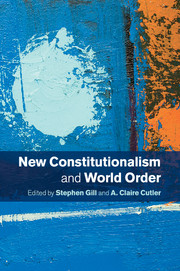Book contents
- Frontmatter
- Contents
- List of Figures
- List of Contributors
- Acknowledgements
- List of Acronyms
- 1 New constitutionalism and world order
- Part I Concepts
- Part II Genealogy, origins and world order
- 5 Toward a genealogy of the new constitutionalism
- 6 The origins of the new constitutionalism
- Part III Multilevel governance and neo-liberalization
- Part IV Trade, investment and taxation
- Part V Social reproduction, welfare and ecology
- Part VI Globalization from below and prospects for a just new constitutionalism
- Glossary
- Appendix
- Bibliography
- Index
6 - The origins of the new constitutionalism
Lessons from the ‘old’ constitutionalism
from Part II - Genealogy, origins and world order
Published online by Cambridge University Press: 05 February 2014
- Frontmatter
- Contents
- List of Figures
- List of Contributors
- Acknowledgements
- List of Acronyms
- 1 New constitutionalism and world order
- Part I Concepts
- Part II Genealogy, origins and world order
- 5 Toward a genealogy of the new constitutionalism
- 6 The origins of the new constitutionalism
- Part III Multilevel governance and neo-liberalization
- Part IV Trade, investment and taxation
- Part V Social reproduction, welfare and ecology
- Part VI Globalization from below and prospects for a just new constitutionalism
- Glossary
- Appendix
- Bibliography
- Index
Summary
Transformative changes have been taking place in the constitutional domain. Over the last few decades, the world has witnessed the rapid spread of constitutionalism and judicial review at both the domestic and supranational levels. Constitutional supremacy, a concept that has long been a major pillar of the American political order, is now shared, in one form or another, by over 160 countries and several supranational entities across the globe. Most of these polities can boast the recent adoption of a constitution or a constitutional revision that contains a bill of justiciable rights and enshrines some form of active judicial review. Consequently, constitutional courts and judges have emerged as the key translators of constitutional provisions into guidelines for public life, and as a main forum for articulating and dealing with foundational political questions that define the boundaries of the collective or cut through the heart of entire nations. Meanwhile, the international migration of constitutional ideas has grown exponentially (Choudhry 2006), accompanied by the rise of what may be termed ‘generic’ constitutional law – a supposedly universal, Esperanto-like discourse of constitutional adjudication and reasoning, primarily visible in the context of negative or ‘first-generation’ rights and liberties (Law 2005; Law and Versteeg 2011). In this new constitutional environment, even bastions of agnosticism toward American-style high-voltage constitutionalism and judicial review cannot entirely avoid some of the developments taking place internationally (Jackson 2010; Tushnet 2009).
Alongside this considerable expansion in the ‘traditional’ constitutional realm, a phenomenon that scholars have termed the ‘new constitutionalism’ has emerged (e.g. Gill 1995a, 2003). This phenomenon often refers to the largely pernicious spread of a set of quasi-constitutional supranational treaties and institutions that place global economic governance beyond democratic reach, and promote uneven development by privileging transnational corporations at the expense of the world’s economic hinterlands. As Stephen Gill observes, ‘[n]ew constitutionalism is a macro-political dimension of the process whereby the nature and purpose of the public sphere has been redefined in a more privatized and commodified way … it can be defined as the political project of attempting to make trans-national liberalism, and if possible liberal democratic capitalism, the sole model for future development. It is therefore intimately related to the rise of market civilization’ (Gill 1995a: 412).
- Type
- Chapter
- Information
- New Constitutionalism and World Order , pp. 95 - 108Publisher: Cambridge University PressPrint publication year: 2014
- 5
- Cited by

